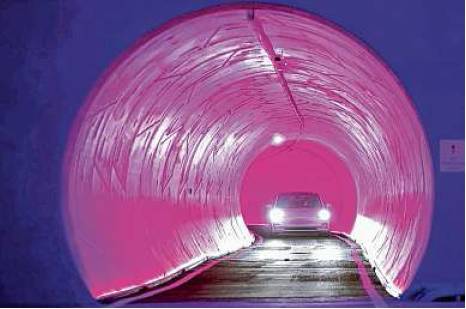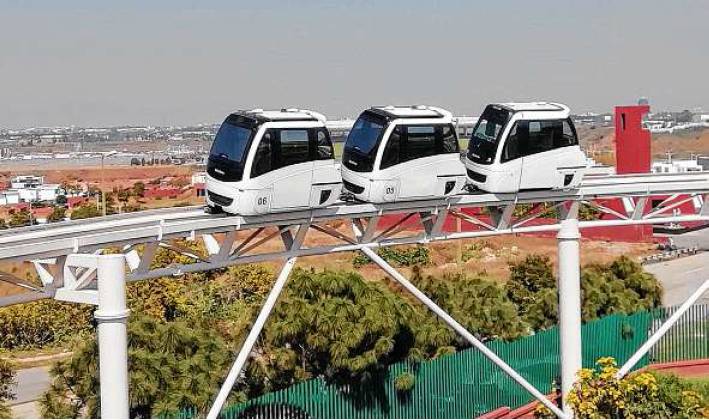Decision coming on airport shuttle
Local consortium, Musk firm finalists for transit project
By Eric Killelea STAFF WRITER
The Alamo Regional Mobility Authority could decide Wednesday whether to pursue one of two proposals — including one from SpaceX and Tesla CEO Elon Musk’s tunneling company — to shuttle visitors between San Antonio International Airport and downtown.
Austin-based the Boring Co., backed by Musk, “is proposing twin underground tunnels that would accommodate Teslas” to transport riders, according to a January presentation to the RMA board. The estimated cost would be between $241 million and $298 million.
Bexar Automated Transport proposed “an autonomous bus traveling via a combination of elevated and underground tracks,” according to the presentation. It would cost an estimated $330 million.
BAT is a consortium that includes SAK Construction LLC, a Missouri pipeline services and tunneling firm; North Carolina’s Thalle Construction Company Inc.; and ModuTram Mexico, a software company in Guadalajara, Mexico.
Two weeks after Alamo RMA board members held closed-door interviews with the competing groups, they’re set to discuss financial and build-out plans at a public meeting 3 p.m. Wednesday at the Bexar County Public Works Department.
Alamo RMA Chairman Michael Lynd Jr. said the seven-member board could select a finalist and start negotiating a development agreement. Or the board could postpone its decision — or scrap the idea altogether.
“Even if we decide to move forward with a group this week, there’s no assurance that we’ll get to a point that we’re comfortable that the concept is viable,” said Lynd, CEO of Kairoi Residential.
The Boring Co. would self-finance its project before turning it over to the RMA, according to county officials. The company probably is looking to generate income by operating the loop.
BAT said it would require a public subsidy for construction and recommended that VIA Metropolitan Transit operate the system.
The RMA said it could sell bonds to help finance such projects.
“Ultimately, it’s got to be financible,” Lynd said. “As the RMA, we don’t have a bunch of money sitting in a bank account that we can throw at a project like this.”
On the cusp of the decision, he said the RMA didn’t set out to take on a large airport-to-downtown project.
In October 2019, the board invited public and private groups to submit ideas regarding “new delivery methods for transportation projects” and “development of new revenue sources.”
The Boring Co. responded last July.
After staff reviewed the proposal, the RMA formally asked contractors to submit plans for “a transportation project that can efficiently and economically transport people between the general vicinity of the San Antonio International Airport and the downtown area of San Antonio.”
The RMA received five proposals by the Dec. 1 deadline. The board named the finalists in January.
By car, the 9.6-mile trip between the airport and downtown area takes about 15 minutes, mostly on U.S. 281 — not exactly a long haul.
Still, Lynd said the RMA has been seeking “creative” moneymaking projects.
Created by the county, the independent agency works on transportation projects, but its funding is scant, limited to vehicle registration fees. The RMA could bring in revenue from the operation of toll roads, but it has no such projects — largely because of fierce opposition to toll plans in the past.
Toll roads are the main source of revenue for most other RMAs in Texas.
“What we’re trying to do is ask, ‘Is there some way that we’re not thinking about that we can get into a venture with someone to get into a revenue stream?’” Lynd said.
He also said there appears to be a need for an alternative to the airport-to-downtown transportation provided by the VIA buses, cabs and Uber and Lyft rideshares. Many visitors landing at San Antonio International stay downtown for business, conventions or leisure.
The RMA — whose members are appointed by Bexar County commissioners, and its chair by Gov. Greg Abbott — has refused to release the Boring CO.’s and BAT’s full plans.
Two weeks ago, Lynd selected three board members, including himself, and staff to a hold private interviews with the groups. Four board members would’ve made a quorum, which would have made the interview open to the public.
Bexar County spokeswoman Monica Ramos said both finalists “requested that their interviews be closed to the public because they were concerned about disclosing private financial information.”
Neither the Boring Co. nor BAT responded to requests for comment.
“Because we were able to be behind closed doors, we could ask some pretty significant detailed questions about specifics of their operations that they felt like were proprietary,” Lynd said.
The Boring Co. built a 1.7-mile, 3-station transportation loop that opened in June beneath the Las Veges Convention Center, at a cost to taxpayers of $52.5 million. But it’s unclear what the company would charge local passengers or how much revenue the system would generate for the RMA.
BAT’s plan calls for passengers paying $6.50 per trip, according to documents provided by Praetor Capital, a firm that invests in automated transit networks and that’s partnering with the consortium. Passengers could catch rides from several stations between the airport and downtown. They’d board eight-passenger electric vehicles that run at 45 mph for a trip from the airport to the Convention Center. BAT estimates ridership at about 500,000 per year, for revenue of $13.7 million. eric.killelea@express-news.net

